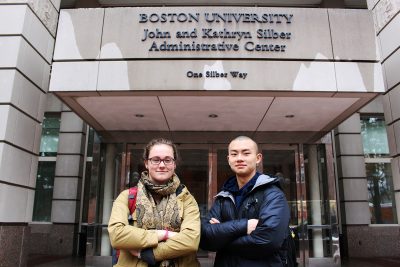
Since Jan. 31, Divest BU has been sending two of its members to Boston University President Robert Brown’s office every day in an attempt to have a face-to-face meeting with him. They have documented their success, or lack thereof, on their Facebook page.
The group held a rally and delivered a petition to Brown on Dec. 8 with the goal of persuading the Board of Trustees to divest endowment funds from the fossil fuel industry. This petition demanded the topic of fossil fuel divestment be placed back on the Board of Trustees’ agenda in response to President Donald Trump’s election.
Brown responded to the petition in a letter to the student group Jan. 24, where he acknowledged the group’s grievances and highlighted the university’s efforts to reduce its environmental impact.
BU spokesperson Colin Riley said the university has responded to Divest BU’s demands and environmental concerns in general, citing initiatives the university has taken efforts to reduce its carbon footprint.
“The university has been very responsive to these issues, starting with the creation of the Advisory Committee on Socially Responsible Investing, which was created several years ago to monitor the investments of the university,” Riley said. “More recently, the Climate Action Plan was created by President Brown and the Board, which is a task force that is specifically addressing ways to decrease energy use and other environmental issues.”
Brown stated in his letter that the Board has already adopted some of the ACSRI’s recommendations, namely forming the Climate Action Plan, a university-wide initiative to make BU more energy-efficient.
Regarding the ACSRI’s recommendation to halt investments in companies still searching for new oil reserves, the Board has “endorsed avoidance of investment in coal and tar sands on a ‘best efforts’ basis,” Brown statet.
This response has not appeased Divest BU, its members said.
Divest BU wrote in its petition to Brown and the Board that this decision “neglects a crucial portion of the ACSRI’s proposal: to divest from ‘companies that continue to explore for fossil fuel reserves of any kind.’
The petition also stated that Trump Administration’s decisions regarding climate change warrant a prompt reconsideration of divestment from BU’s investors.
“It is more important now than ever that institutions across the nation such as Boston University take this moral stand against climate injustice, in the face of a federal government that refuses to acknowledge its very existence,” the petition stated.
In response, Brown wrote to Divest BU that the board avoids taking political stances and thus will not be readdressing divestment as a result of the new administration.
In response to President Brown’s letter, the coalition is “planning to release an open letter to President Brown in response to his letter to us in a publication,” Masha Vernik, a Divest BU student leader, said.
In the meantime, Divest BU will be continuing its lobbying efforts — The group is planning a rally on March 1 to, among other things, demand BU’s divestment from fossil fuel companies, said Vernik, a sophomore in the College of Arts and Sciences.
Students’ opinions were mixed regarding Brown’s response to Divest BU’s petition.
Jessica Weiss, a sophomore in the College of General Studies, said Brown’s response to Divest BU sets a poor example for students as well as other universities who could potentially divest from fossil fuels if BU did.
“If [President Brown] agreed to divest from fossil fuel companies, his actions could set off a chain reaction that would encourage other schools to divest their [endowments], too,” Weiss said. “What kind of example are we setting if our school is investing in [fossil fuel] companies that are ruining our environment?”
Hannah Giffune, a sophomore in CGS, said she believes the university would be better off in the long run by investing in renewable energy rather than fossil fuels.
“I think because we have very efficient alternatives for fossil fuels, it’s not necessary to use them or invest in them,” Giffune said. “We should learn to cut down costs by using renewable energy, rather than investing in fossil fuels that might be profitable but are detrimental in the long run,” she added.
Nicolas Restrepo, a freshman in the Questrom School of Business, said he thinks Divest BU should reconsider the impact on the university’s funding abilities if it were to divest from the fossil fuel industry abruptly.
“If we take away all the funding that we get from [investment in the fossil fuel industry], so much money is going to be taken away from things that we actually need,” Restrepo said. “So many of the programs that [students] are in, they are fighting to take away the funding for. They’re just going to lose all their programs.”


















































































































